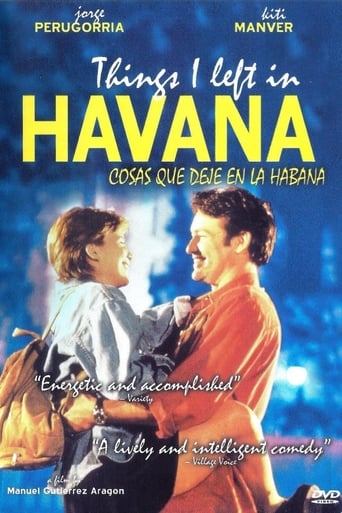

Masterful Movie
... View MoreI gave it a 7.5 out of 10
... View MoreIt’s an especially fun movie from a director and cast who are clearly having a good time allowing themselves to let loose.
... View MoreThe film may be flawed, but its message is not.
... View MoreThe movie Cosas que dejé en la Habana was released in 1998 by Manuel Gutierrez Aragon and has definitely done lots of good for the public. A good movie can have many different parts of it, but one of them is an appropriate, often profound message. Aragon uses the generation of those fleeing Cuba for a better life (in this case, to Spain) to educate the greater audience on problems that immigrants face. This movie focuses around two separate groups of people. The first are the three sisters, Rosa, Ludmila, and Nena. They are all originally from Cuba but move to Madrid to have a better life. There they stay with Maria, their aunt. She is also from Cuba but has lived in Madrid for a while so she knows both ways of life. The other group is that of Barbaro, Nati, and Igor. In my opinion, I think that these two groups should cross paths sooner than they end up doing. In the movie (spoiler alert) Igor has a relationship with both Nena and her friend Azucena (which at first is kept secret from both of the women). At first I was a little confused about what was going on because it was never really explained, but then I realized that Igor was cheating on both of them. This movie is based in the 1990s (when it was made) when Cuba was going through an economic crises. Thousands of people had to leave the only home they had ever known, in order to find opportunity to even just survive. Personally I like that this movie isn't really depressing, even though what these people had to go through was. Aragon definitely does a good job of shedding light on the history of Cuba and Spain while still keeping the audience intrigued. Things like this are hard to watch and learn about, but it is absolutely necessary. Aragon does a good job of using the three sisters to show the struggle in a more relatable way (at least it was relatable for me because I am only a bit younger). I also like the character of Javier because Maria does not really care about his sexuality and how he does not truly want to marry one of her nieces, which to me adds some comedic relief to the stressful plot. Lastly I like how the title plays into the story. The whole time I was watching, I was waiting to find out what "things" they left in Havana. However after watching the whole thing, I realized maybe the title isn't referring to physical things. I think it is referring to the life, culture, and love they had to leave behind for a better life. I would recommend Cosas que deje en la Habana to people who already know a bit about this economic crisis because it will be less confusing from the start. I would not recommend it to people who purely like comedy, because the humor is pretty cut and dry. I also would not recommend it to people who cannot stand slow-progressing movies, because this one takes a while for the ending to finally come, and like I said before it takes quite a while for the two main groups to finally cross paths. However overall I recommend this movie because it both is educational and entertaining for the greater good.
... View MoreForeign films are so good at combining comedy with drama and creating films that leave us wondering if we should laugh or cry. There are lots of moments in this film that are funny, but overall it's a sobering look at what it feels like to live in exile. The film starts out in Havana so we can understand what the characters are leaving behind. Spain offers more economic opportunities, but none of the Cubans who go there are really happy. They want things they can't have at home - career opportunities, money, a nice house - but they miss the warmth and color of their island. The aunt (Daisy Granados) has tried to become less Cuban and more Spanish, but she's just a bitter and frustrated woman who wants everyone else to be as unhappy as she is. Although she claims she can't stand Cuban food, she sneaks into the kitchen at night and eats it cold out of the pot when no one is looking - what a perfect metaphor for the way she covers up her true identity in order to "fit in" in her new country. Nena (Violeta Rodriguez) and Igor (Jorge Perugorría) have great chemistry and make a great romantic couple. The constant struggle between money vs. love, economic opportunity vs. home is heartbreaking. It makes you realize that most Cubans who leave the island are only leaving because of economic hardships, and that if they had a choice, they're rather not leave.
... View MoreCubans go away from their country looking for better standard of life, some go to USA and others go to Europe. The reality is that they were, are and will be Cubans for ever, missing always their motherland. This film is an evidence of homesickness by Cubans. It also shows how the naive emigrants are sometime exploited by even experienced compatriots.
... View MoreThis movie, a Cuban-Spanish co-production, was written by a Spaniard who admittedly remembers his mother's nostalgia for Havana of the 50's. The first problem lies there in: the Havana of the 50's is not the Havana of the 90's these ladies just left. How can you romanticize or be nostalgic about America's Beirut? Secondly, the refugees from Havana, and their overly capitalistic (in the worst of contexts) aunt are all Cuban state paid and controlled actors. They appear in most if not all examples of this new 90s genre, the Cuban-European co-production, where Cuba supplies the raw materials (actors, technical support, sets, locations) and the Europeans (WHAT ELSE?)the money and distribution. The Cuban government gets its much needed hard currency this way, and shows a gullible world how conscious Cubans are of their plight and what an open society they live in (STRAWBERRY AND CHOCOLATE, one of the first of this genre is akin to the Chinese depicting their compassion on Tianemen Square).The film stars the omni present Jorge Perugorria (one of Cuba's cash cows),and former Communist propaganda movie star Daisy Granados as the evil, capitalist aunt, as well as the daughter of one of the Cuban regime's signature musicians, the very loyal to the party Silvio Rodriguez. Kind of like an Albanian Kossovar family drama made by Milosevic's handpicked Serb stars. A fantasy, and enjoyable at that if you can understand the irony of it all.
... View More